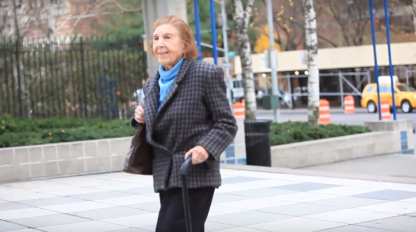By Aislinn Keely

One of Fordham University’s oldest students walks to Lincoln Center for a day of classes with the College at 60 program. (Courtesy of University Herald).
Barbara Flaxman is what one might call a “super, super senior.” For the past five years, she has taken classes at Fordham College Lincoln Center, but at 75 years old, she is more than a few years older than most undergraduates.
Flaxman belongs to Fordham’s College at 60 program, which references both the minimum age of admission and its location on West 60th Street in Manhattan. The program has been an important part of her life for the past half a decade. “[I go] for enrichment, for excitement, for knowledge, for sociability,” she said. “It just offers everything.”
Since the program’s founding in 1973, senior students have been able to take classes across a variety of concentrations for the sake of learning – no grades are awarded in the program. Approximately one-third of its members are Fordham alumni.
The program is not heavily advertised, and students often hear about it for the first time through word of mouth. Flaxman, for example, heard about the program through a tour group before exploring enrollment.
“It sounded really interesting,” she said. “Something I’d like.”
Flaxman said she is limited to the courses she takes based on her work schedule, but her course load has consisted largely of the humanities and social sciences. She has taken history, theater and sociology courses, as well as a course that focuses on the 18th century author Jane Austen.
Pamela Oppenheim, 86, has taken advantage of the offerings.
“I took a philosophy course, and at least two music courses,” said Oppenheim. “Then I decided I wanted to do something that was just so much fun, that’s why I took [an] American musicals course.”
The College at 60 program was founded in 1973 with the intention of transitioning students that were unable to earn a degree in their early life into a degree program, according to Cira T. Vernazza, associate dean and director of the College at 60 program at Fordham. The program originally attracted many senior learners that had been deterred from obtaining a degree by roadblocks like The Great Depression, 20th century wars and an overall lack of opportunity to attend college.
Since degrees are no longer offered, the program now serves a somewhat different purpose for its students, according to Vernazza.“Whereas the earlier groups in the 70’s and maybe even the early 80’s came in order to get their degree, the groups now are coming for lifelong learning,” said Vernazza.
Many attendees already have multiple degrees and are not seeking to add to their credentials, but to their educational experience. Those enrolled can apply for entry to the Professional School of Continuing Studies if students wish to do so, though most do not.
The lack of grading has a way of freeing conversation, according to Dr. Robert Spiegelman, a professor in the College at 60 program.
“I’m not dealing with people who are staying silent because of a grade or because they’re afraid to disagree with me,” said Spiegelman.
To advance to the Professional School of Continuing Studies, applicants must complete an admissions exam and file application materials, including any past collegiate transcripts.
However, those who wish to enter the College At 60 program need only meet the age requirement and attend a meeting with Dean Vernazza to determine if the program fits the needs of the student.
Once enrolled, students choose from a variety of two hour long liberal arts classes, ranging from courses like Topics in History: The Evolution of the U.S. Constitution to Issues in Psychology to Italian Cinema from Neorealism to the Present.
In addition to the current courses, the program holds a free weekly lecture series in Lincoln Center’s twelfth floor lounge. The series is open to the public aged 50 and over on Wednesdays from 2:30 p.m. to 3:30 p.m. Fordham students can call to request the opportunity to sit in on a lecture if it pertains to a course.
The program attracts a variety of instructors connected to the Fordham community, including retired Fordham faculty and adjunct faculty from throughout the tri-state area.
A College At 60 classroom setting is similar in many ways to that of an undergraduate class. Students use BlackBoard to obtain suggested reading assignments, take out smartphones to cross reference information and find dates pertinent to the lecture, analyze paintings and documents on a Smartboard and doodle in notebooks and answer texts quietly.
A marked difference, however, is the experience level of the students. Many had visited the Venice landmarks Spiegelman referenced in class. They asked questions on how the information pertains to today, made the occasional clerical correction and picked apart the theories Spiegelman presented for class discussion. And, of course, that one is more likely to sit next to a centenarian.
